10+ Vitamins for Women Over 50
There is no better time to update your supplements than when you turn 50. This article shares some vitamins for women over 50, plus reasons why most women likely need to consider supplementation as part of their self-care and anti-aging routine.
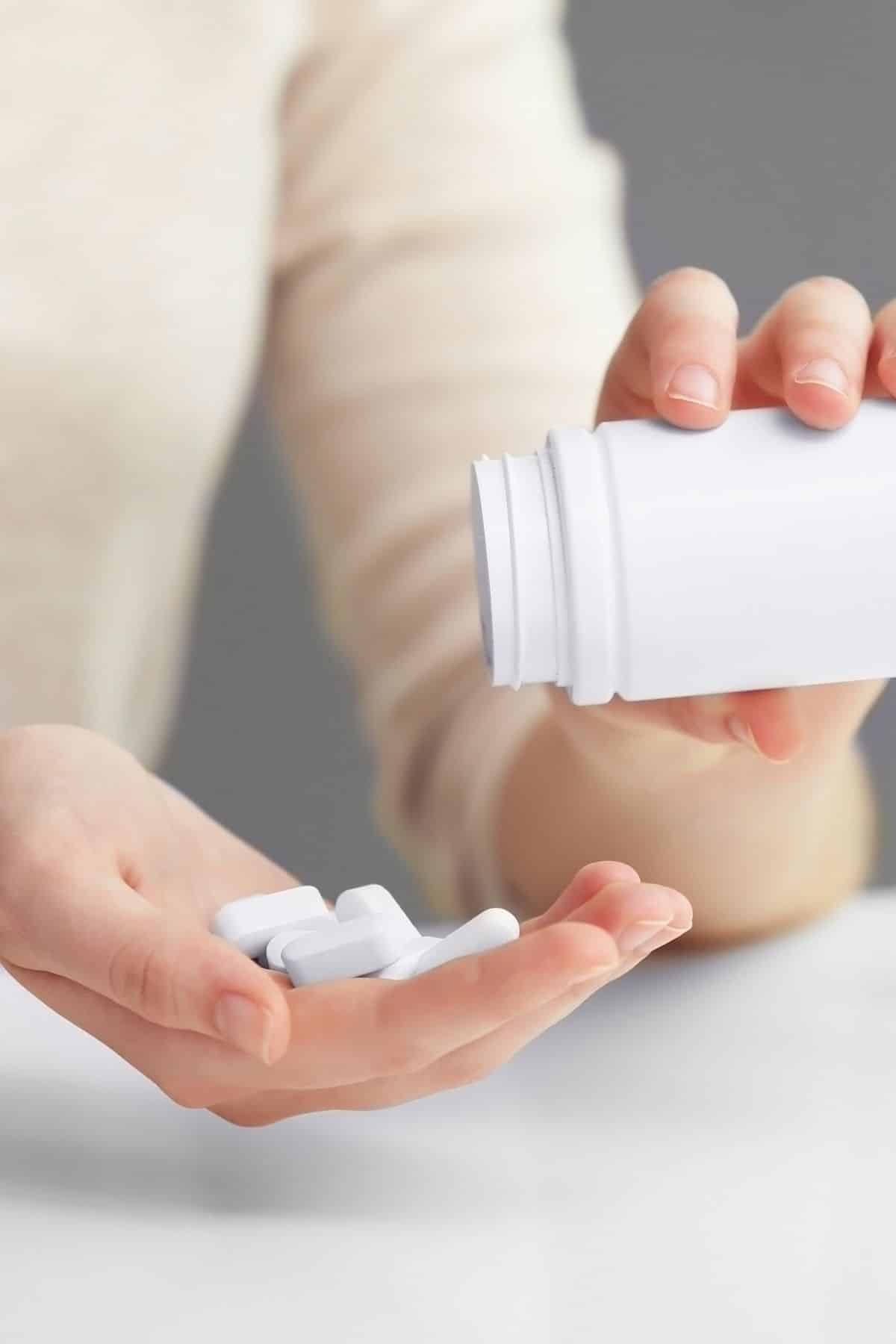
Why Women Over 50 Need Vitamins
Women over fifty years old are presented with different challenges than women in our earlier years. The most notable change is that 51 is the average age that women enter menopause, the ceasing of the menstrual cycle.
Menopause is associated with lower levels of reproductive hormones, especially estrogen and progesterone. Because of this, menopausal women are more susceptible to hot flashes, night sweats, mood swings, depression, brain fog, insomnia, urinary incontinence, lowered sex drive, thinning skin, and osteoporosis.
Even if women over 50 have not yet entered menopause, they are likely to be in perimenopause which is the transition period between having normal menstrual cycles and menopause. Learn more about how to eat for your menstrual cycle and supplements to reduce menopause joint pain.
Other potentially big stressors and changes that women over fifty have to deal with include:
- taking on more leadership roles at work or in the community
- raising teenagers
- caring for aging parents
- adjusting to empty-nesting after children move away
- getting divorced or remarried
- down-sizing or moving to a new home/location
All of these changes can lead to shortages of key nutrients which may be found in supplements. Healthy aging is all about meeting your nutrient needs through both diet and supplementation tailored to your specific needs.
See my related article on how to increase estrogen naturally.
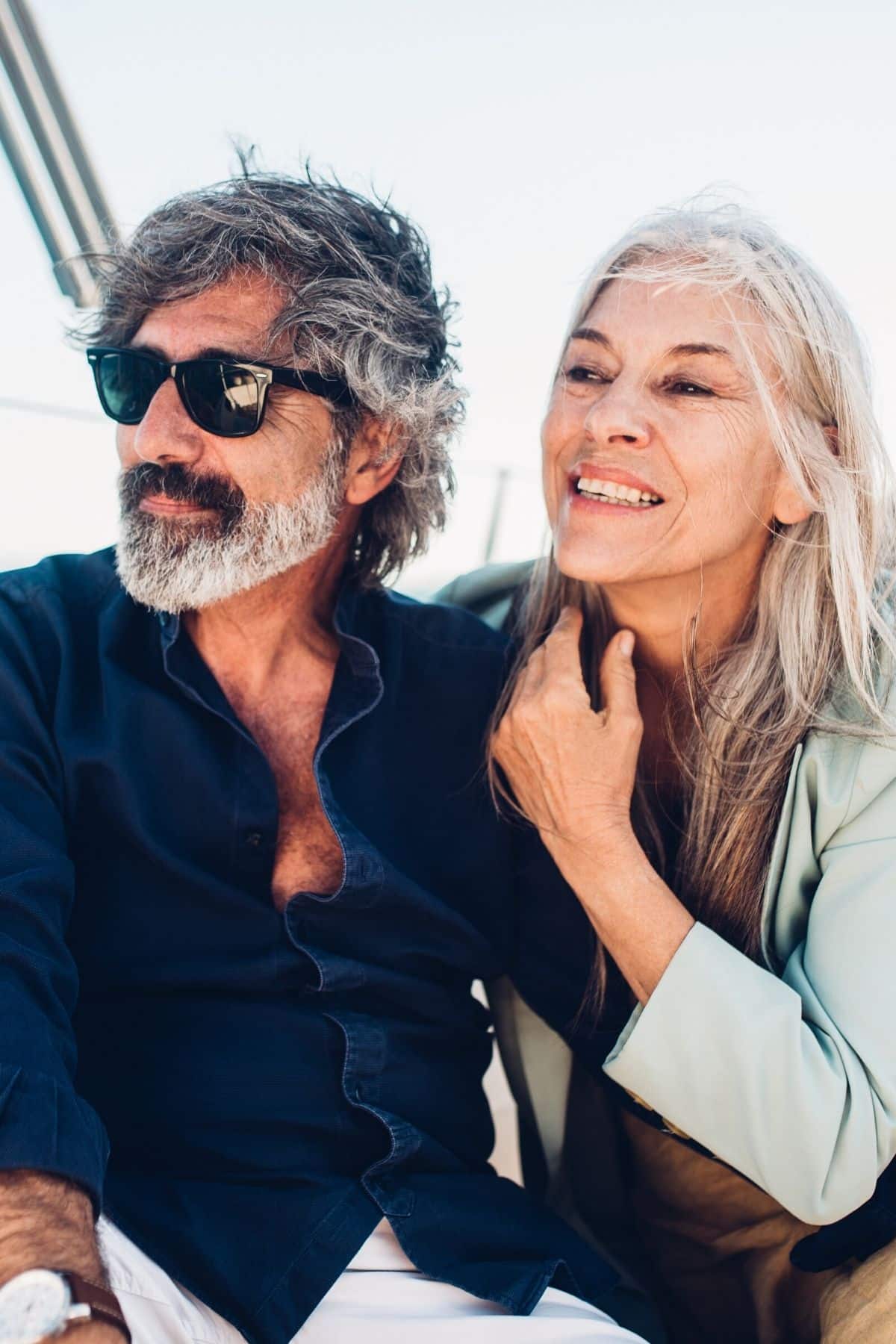
Taking Supplements is Self Care
With all of these life stressors, it’s so important for women at every age to take care of ourselves!
Self-care can include everything from getting enough sleep, eating more fruits and vegetables, learning to manage stress better, and taking vitamin supplements to help support mood, stress, energy, and vitality.
I hope you enjoy this post today. While I’m not yet fifty, I’m not that far off. I can already feel my body changing as I get older. They’re not necessarily bad changes and I’m not fearful of aging, but I also know how important it is to stay strong, balanced, and healthy at every age.
If you’re new to natural health topics, then you might like my article with holistic health tips.
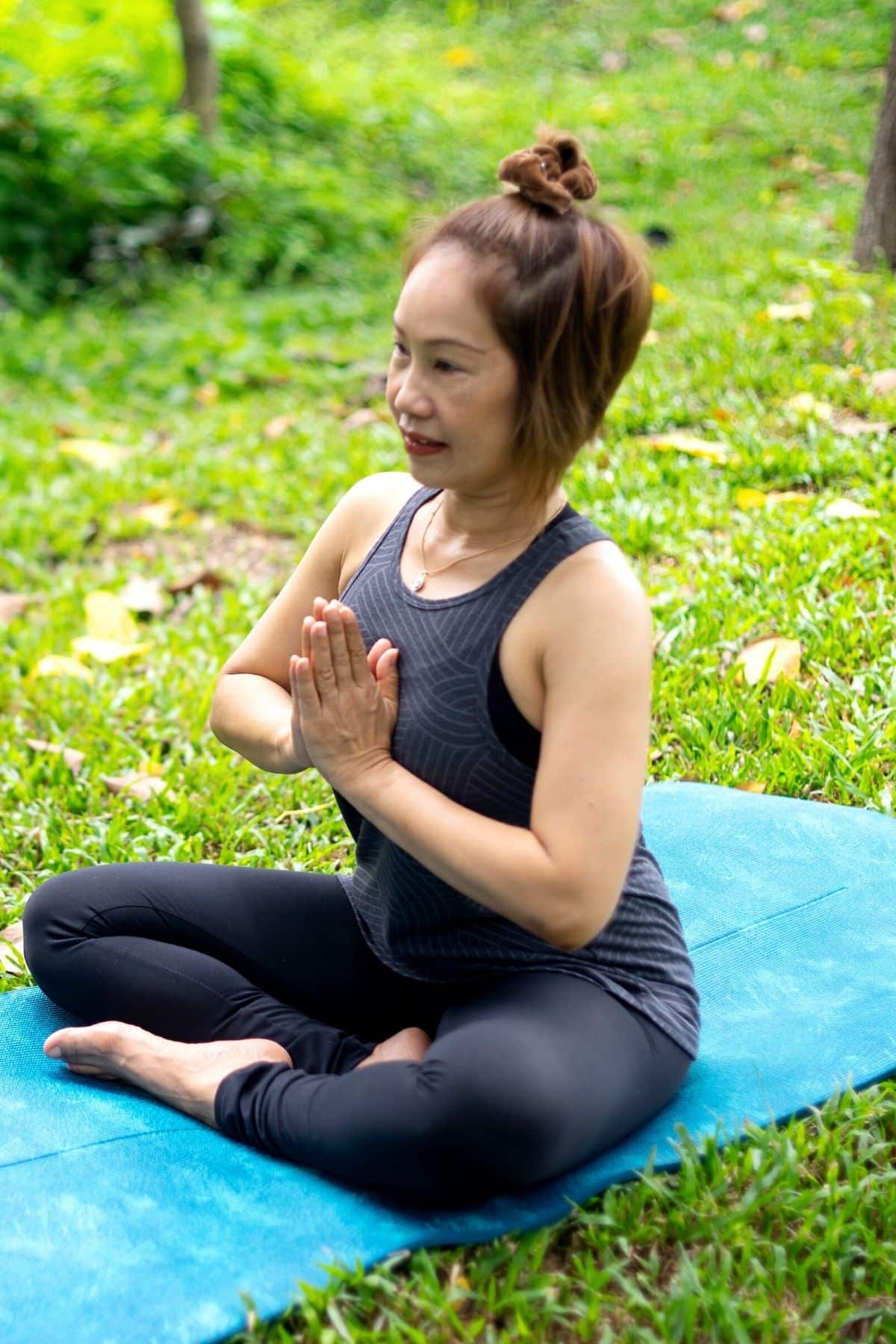
Vitamin Supplements for Women Over 50
I’ve rounded up some vitamins for women over 50 to take. I’ve also include some multivitamin supplements for women over 50 at the end of this list.
You might also like my articles on the Vitamins for a Teenage Girl and the Supplements for a 30 Year Old Woman.
While not every woman needs every vitamin on this list, these are the most common dietary supplements that can help with symptoms of aging and hormone changes. As always, please ask your doctor about which of these are right for you.
If you’re looking to switch to a functional medicine practitioner who can offer a much more customized approach to supplements, then check out my article on how to find functional medicine doctors near me.
You may also want to check out my article on the vitamins for gums and teeth.
1. CoQ10
Coenzyme Q10, often shortened to CoQ10, is a compound that helps generate cellular energy. Our bodies produce CoQ10, but production slows down as we age. Thus, women in their 50s and older adults tend to be more deficient in this compound.
CoQ10 comes in two forms: ubiquinol and ubiquinone. It’s best to supplement with the ubiquinol form of CoQ10 since it is more absorbable. CoQ10 is a fat-soluble compound so it is best taken with a meal that contains a healthy fat source.
There are other things besides aging that can reduce CoQ10 production in a woman’s body. The most common one is the use of prescription medications especially statins for lowered cholesterol support. If you take a statin medication, you’ll definitely want to consider CoQ10.
CoQ10 is also on my list of the best supplements for dry eyes.
Brand recommendation for CoQ10:
2. Black Cohosh or Chinese Ginseng
Black cohosh is currently being studied for the treatment of symptoms associated with menopause. It is also being studied as a supplement with the ability to help menopausal women stave off osteoporosis.
Chinese ginseng, also known as panax ginseng, might be another option for controlling hot flashes for some women.
This herb has also shown to be beneficial for mood swings associated with menopause as well as sleep disturbances associated with reduced estrogen production.
Brand recommendations for Black Cohosh Root and Ginseng:
3. Magnesium
Magnesium deficiency is quite common among women in their fifties in the United States. Deficiencies in this crucial mineral could lead to muscle cramping and weakness, bone pain, increased anxiety, depression, fatigue, high blood pressure, irregular heartbeat, headaches, sleep disorders, and more.
It is recommended that women in their fifties and beyond supplement with at least 400 mg of magnesium daily.
If you are taking an antacid, blood pressure medication, antibiotics, or any type of hormonal replacement therapy medication, you will need to supplement with even more magnesium. It’s also a good idea to try and eat lots of magnesium-rich foods, such as from a balanced diet including lots of green vegetables.
Learn more about the different types of magnesium.
Brand recommendation of magnesium:
4. DIM
Diindolylmethane, or DIM, has been shown to promote a healthy menopausal transition.
DIM is derived from cruciferous vegetables and is used to support estrogen metabolism in premenopausal and postmenopausal women.
DIM is such an amazing supplement – it has research showing that it can prevent breast cancer because of how it helps metabolize estrogen (read more about how to reverse estrogen dominance naturally).
I highly recommend asking your healthcare practitioner about starting this one.
Brand recommendation of DIM:
5. Passion Flower or Valerian Root
Perimenopause and sleep disruptions seem to go hand-in-hand. This is most likely caused by fluctuations in estrogen. But, there are some supplements and herbs that can help!
Passion flower has been used for centuries as a calming herb and sleep aide. Research has shown that compounds found in passion flower bind to GABA receptors in the brain and nerves, which are responsible for promoting calmness and relaxation.
Valerian root is another medicinal compound that has been used for sleep disorders, namely insomnia, or centuries. Studies have shown that use of valerian root can help people fall asleep faster and get into a deeper REM state of sleep.
However, valerian root should not be used if you have a known liver disorder or are currently taking a benzodiazepine. It should not be combined with alcohol or any other nervous system depressants. It has also been shown to negatively react with St. John’s Wort. So, please consult your healthcare provider to make sure valerian root is safe for you.
Brand recommendations for Passion Flower and Valerian Root:
6. Turmeric for Inflammation
Turmeric is often a much better and less potentially harmful anti-inflammatory option over non-steroidal anti-inflammatories medications (NSAIDs) like ibuprofen and aspirin.
Curcumin is the key component in turmeric that has been shown to be beneficial for inflammation.
Turmeric has been used for centuries to help alleviate inflammatory conditions caused by wounds, infections, and diseases. Chronic inflammation is something quite a few people tend to deal with as they age. That’s why it’s recommended to take a turmeric supplement that contains a good dose of curcumin.
Brand recommendation for Turmeric:
7. Omega-3 Fatty Acids
Omega-3 fatty acids have many benefits. The essential oils found in fish oil have been shown to help fight mood disorders such as anxiety and depression.
EPA and DHA, the essential omega-3 fats found in fish oil, are essential to optimal health. You can find these fats in cold water fish like salmon and sardines.
See my clean eating whole foods shopping list for more foods you should be eating.
Omega-3 fatty acids in particular have research showing they can help with depressive symptoms during menopause and may also help reduce hot flashes and other troublesome symptoms.
Brand recommendation for Fish Oil:
8. St. John’s Wort
St. John’s wort is a wild plant that has been used for centuries to treat mood disorders such as depression. Several recent studies have shown St. John’s wort to be as effective as prescription antidepressants for improving mood disorders.
Short-term usage of St. John’s wort is worth a try if you’re feeling a little blue. There is also research showing that St. John’s Wort may help with hot flashes, especially when taken with black cohosh.
But please consult your healthcare practitioner about any possible interactions or if you experience side effects. St. John’s Wort can reduce the effectiveness of hormonal birth control.
Brand recommendation for St. John’s Wort:
9. Calcium + K2 + D3
As we age, we leach more calcium from our bones.
We need adequate amounts of calcium to help prevent post-menopausal bone loss. However, the most recent research recommends against taking a stand-alone calcium supplement. It’s safer to combine calcium with vitamins K2 and D3.
Taking calcium with vitamin K and D3 helps to get it to its intended place, the bones, as opposed to the arteries or kidneys. Vitamin D3 controls the absorption of calcium into the blood while vitamin K2 controls where the calcium ends up.
Deficiencies in calcium, K2 and D3 can have negative effects on our immune system as well. Supplementing with them is beneficial if you want to experience healthier aging in addition to better bone health.
Some women will also need to take an additional vitamin d supplement to help reduce chronic diseases.
Brand recommendation for Calcium + K2 + D:
10. B Vitamins
The B-vitamins are a family of water-soluble vitamins that our bodies use for many functions.
Our bodies need adequate amounts of vitamin B to produce energy from the foods we eat- given that we’re eating nutrient-dense foods that our bodies can turn into useful energy.
B12 is the star B vitamin when it comes to energy production. However, all of the B vitamins are necessary for optimal health including heart health and brain health. There is research showing that B vitamin intake during menopause can help with cognitive issues and hot flashes.
Brand recommendation for B Vitamin Complex:
Bonus: Multivitamin Recommendation for Women 50+
A good quality multivitamin is also essential for women of all ages. If you’re over 50, however, you want to choose a multivitamin that is formulated to meet your needs and provide all the essential nutrients.
You may need to review the list of vitamins, minerals, and herbs that are included in whatever multivitamin supplement you select to ensure that you aren’t already taking it separately.
You also want to make sure you aren’t taking a multivitamin that includes things that you don’t need. For example, a woman in menopause who is not menstruating likely will not need to take iron in a vitamin.
A qualified healthcare practitioner can help sort out your vitamins if you need extra help.
Otherwise, here are some multivitamins for women over 50:
- Pure Encapsulations Women’s Nutrients | Multivitamin for Women Over 40 to Support Urinary Tract Health, Breast Cell Health, Eye Integrity, and Emotional Health
- Seeking Health | Optimal Start | Daily Multivitamin Without B12, Iron, Calcium or Folate
FAQs
Prenatal vitamins are a good multivitamin source for women of childbearing age. But, because the majority of women over the age of 50 are post-menopausal, it’s probably better that they choose a multivitamin specifically formulated for women who are in that stage of life. See my post with the best vitamins for young women.
Prenatal vitamins contain added iron and folate (and sometimes folic acid). While this is great for mamas-to-be, it can pose health risks for older women who no longer menstruate. Iron deficiency is rare in postmenopausal women.
Excess iron in supplementation form can harm organs such as the liver, pancreas, and heart. Excess iron has also been linked to an increased risk for diabetes. Iron overload can also leave some women prone to a condition called hemochromatosis, a common genetic disorder in the United States.
Some of the best advice for optimal health post-menopause is to eat a nutritious, whole-foods diet low in sugar and other refined carbohydrates (see the best foods to eat every day). Women who wish to remain healthy after 50 should also exercise regularly, focusing on both cardiovascular fitness and resistance training.
Don’t smoke or drink excessive amounts of alcohol. See your doctor regularly and monitor yourself for any signs or symptoms that are out of the norm for you.
Try to get good sleep, stay well hydrated, maintain a healthy weight, reduce and/or manage stressors, and practice self-care. Find a solid support group of women who understand what you are going through and meet regularly to socialize with them.
And, please, remember that while the aging process is normal, what is not normal is to feel tired, cranky, and hopeless all the time. See why you’re tired all the time. If you do feel this way, then that’s a signal that it’s time to make some changes. There is no better time than now to get started feeling stronger and more vibrant.
I consider collagen as more of a food than a supplement. But, yes, collagen may help improve skin smoothness and reduce joint pain (learn more about collagen side effects). I include collagen on my list of the best clean protein powders.
Probiotics in a supplement or probiotics from food are generally recognized as healthy for people of all ages. Learn which foods have natural probiotics.
Absolutely not! It is an individual decision based on symptoms as to whether or not a woman needs bioidentical hormones after menopause. Please work with a qualified practitioner to help figure out what would work best for you.
More Women’s Health Resources You Might Like
- Best Supplements for Hormone Balance
- Best Supplements to Reduce Estrogen Dominance
- 7 Ways to Reverse Estrogen Dominance Naturally
- 9 Perimenopause Bloating Remedies
Don’t Miss These Supplement Recommendations!
Conclusions
I hope this article about the best vitamins for women over 50 is helpful. While eating well and practicing good health habits is critical, there are likely some vitamins and supplements that can help with some of the symptoms of aging and hormonal changes including perimenopause and menopause.
Also, this list is not exhaustive! There may be other essential vitamins or herbs that can help with specific nutrient gaps or individual needs, such as focusing on eye health or reducing heart disease. Speak to your doctor or a find a functional medicine practitioner who can help you develop a personalized supplement routine.
Don’t forget to join my newsletter list to get exclusive clean eating recipes and tips. The newsletter is 100% free with no spam; unsubscribe anytime.
About the Author: Carrie Forrest has a master’s degree in public health with a specialty in nutrition and is a certified holistic nutritionist. She is a top wellness and food blogger with over 5 million annual visitors to her site. Carrie has an incredible story of recovery from chronic illness and is passionate about helping other women transform their health. Send her a message through her contact form.
Note: this post is for informational purposes only and is not intended as medical advice. Please consult your healthcare provider for recommendations related to your individual situation.


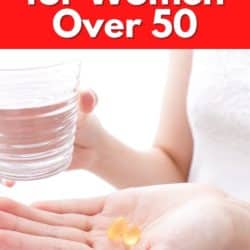
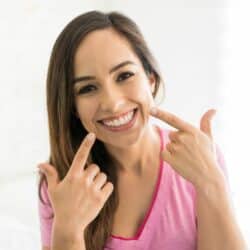
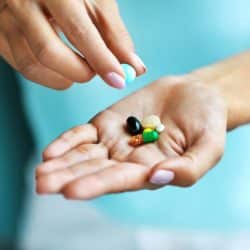
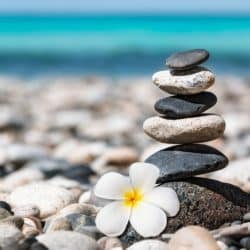
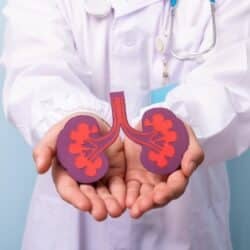




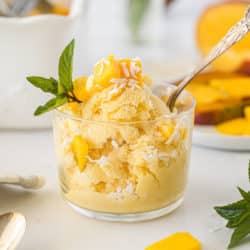









so much to take in. Im sooooooooooo looking forward to getting started i will let u know how i do.
Sincwerely Dawn
I had bloodwork done and my cholesterol was near 900. Also, my thyroid level was over 56. Thankfully my doctor was very knowledgeable and realized it was my very low thyroid levels that were causing my cholesterol problems. After 5 weeks of taking thyroid medicine I was retested and my thyroid and cholesterol levels were back to within normal ranges. Doctor explained to me that when your thyroid level is so bad it can actually be the cause of death as it affects most of the vital organs in your body.
Be careful with valerian root. I try Valerian tea a few times and discovered that it can give very vivid dreams.
Black Cohosh as a potential reduction of hot flashes and menopausal issues is very interesting and something I will be passing on.
P.S. -Thanks you the chance at a giveaway.
I would be interested in knowing if there are natural ways to heal traumatic brain injury.
I’d like to learn more about how to lower high blood pressure naturally.